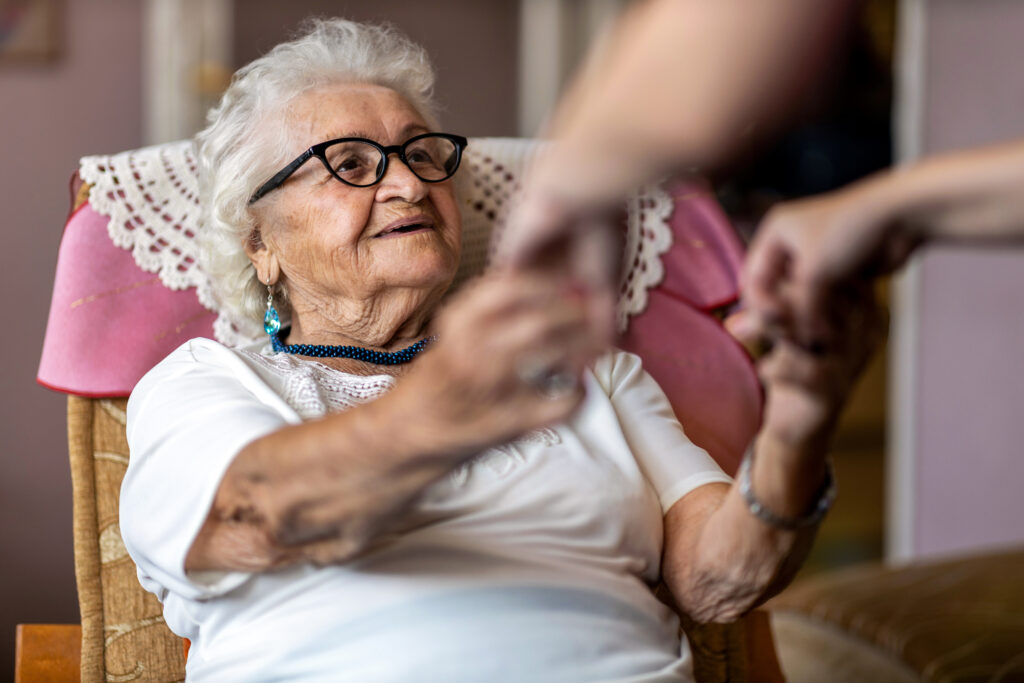What Is Assisted Living- common terms, questions to ask, and how to pay for assisted living?
Assisted living communities are a specific level of care in a community setting. These Communities are typically licensed by the state. Most Assisted Living Communities will provide a bedroom, restroom, meals, and assistance with care. Additionally, the size and amenities of each community can vary greatly and affect cost. Medicare does NOT pay for Assisted Living.
Most importantly, community living allows your loved one the benefit of security and peace of mind. They may experience increased socialization, classes for health and fitness, and quality nutrition plans.

Common terms that differentiate levels and types of senior living:
- Continuing Care Retirement Communities (CCRCs)- typically include independent living, assisted living, residential care and skilled nursing services all on one campus.
- Independent Living Communities – provide residents a setting without the burden of home ownership. Residents commonly live in fully equipped private apartments or cottages from a studio to large two-bedroom units.
- Care Home or Adult Family Care Home- are private residences in a home-like setting that provide care services to a smaller more limited number of residents (typically 5-12 residents, depending on each state’s regulations).
- Assisted Living- provides housing and supportive care in a community setting, but the residents do not require 24-hour nursing care.
- Memory Care- a care setting for residents with memory loss or confusion. The community typically has a “secured” entry for residents that may wander. This care can be provided in different care settings depending on the state licensing requirements.
- Skilled Nursing is state licensed to provide a safe, therapeutic environment for people who require rehabilitative care 24 hours a day.
The most common universal term is assisted living. Some other common terms include: care home, residential care, convalescent home, rest home, or retirement home. The lay person sometimes groups all senior housing into the term of “nursing home.”
Assisted living communities are NOT nursing homes.

What Services Are Provided?
Each State regulates Assisted living communities and determines what care levels and staffing are allowed. Most Assisted living communities provide meals, light housekeeping, and activities program. Additionally, some may also offer support such as scheduled transportation and linen service.
Above all, residents move into these communities to receive assistance with activities of daily living (ADLs):
- Dressing
- Bathing
- Medication assistance and reminders
- Eating
- Toileting and incontinence management
- Transferring
Apartments are typically self-contained private living units, which include:
- Lockable doors
- Private bathroom
- Kitchenette facilities
The fee schedule is regular monthly rent. There may be additional charges for amenities and any specific services. These community settings are terrific situations for individuals who want to live as independently as possible and direct their own care.
Other Services and Amenities in Assisted Living Communities
Transportation: Options vary from community to community, state to state, city to city and so on.
Housekeeping: Typically, assisted living communities provide housekeeping and linen services. Duties may be performed on a daily, weekly or monthly basis.
Life enrichment: Activities should be provided for the enrichment of residents. Typically, these include light exercise, social opportunities, or spiritual programming.
Additional activities and amenities may include:
- Clubs
- Game nights
- Classes
- Parties and other social events
- Planned outings


Licensing and Regulations
Staffing: Staff are licensed and regulated. Regulations are in place to direct the amount of staff required to care for residents.
Documentation: Strict records are maintained for resident care plans, medication assistance if applicable, and any change of condition. In addition, all staff certifications, licenses and additional training are also documented.
Meal services: Typically, one to three meals are provided daily on a schedule basis. Menus must be available to all residents and sometimes need to be available up to one week in advance (state requirements may vary).
Scheduling: The schedule of most care and services should be reliable and predictable.
Grievances: There should be a plan in place for families to voice any grievances or complaints. Communities may have a resident council and family council.
Evacuation procedure:
- In an emergency, a chain of command is initiated. All staff on duty will begin emergency protocols. Members of staff will ensure all residents are out of the units/building while other staff collect all medications and records.
- States differ on the specific requirements for evacuation, level of ambulation and transfer ability needed for each resident.
Who licenses and regulates these care communities?
In the United States, one or more state agencies regulate and oversee assisted living communities. Often, the regulating agency is the Department of Health and Human Services. Licensure and certification bureaus oversee the licensing of these communities.
For example:
- New York: The New York Department of Health licenses and supervises adult care communities.
- Nevada: The Bureau of Licensure and Certification license medical and other health facilities.
- Oregon: The Oregon Department of Human Services, Office of Licensing and Regulatory Oversight licenses assisted living communities.
How to File a complaint – All residents have the right to voice grievances to leadership, agencies or other entities that hear grievances – all without discrimination or reprisal. Grievances may include a situations regarding staff behavior or other residents.
Requirements of Community policy regarding grievances:
- Communities must make information on how to file grievances available to residents.
- There must be a grievance policy in place.
- Contact information for grievance officials with whom a grievance can be filed must be made available to all residents.
Each state has their own specific laws and regulations regarding assisted living, memory care, care homes and other senior care communities.
Expected Monthly Costs of Assisted Living Communities
Paying for assisted living depends on several factors. The average base cost of assisted living in the United States is $4,100 per month. Costs will vary because of the level of care a resident requires, and additional amenities. Some residents will pay a base rate because they only need meals and socialization. Other residents needing additional support with dressing, bathing, medication reminders, incontinence care and transferring assistance require a higher level of care. Therefore the higher the care level, the higher monthly care costs. Additionally, costs will fluctuate depending on the region or state in which you are seeking a community. Further, on a state level, costs differ from city to city.
On the higher end of cost for assisted living:
- The District of Columbia is nearly $7,000 per month.
- Alaska averages to $6,850 per month.
- Rhode Island is $6,825 each month.
- New Jersey is $6,500 per month.
- Washington State is $6,000 per month.
The states which are generally closer to the national average:
- California is $5,250 per month.
- Oregon is $5,050 per month.
- Michigan is $4,250 per month.
- Wyoming is $4,150 per month.
- Pennsylvania id $4,100 per month.
- North Carolina is $4,025 per month.
Options on the more affordable cost spectrum:
- Nevada is $3,750 per month.
- Alabama is $3,500 per month.
- North Dakota is $3,390 per month.
- South Dakota is $3,350 per month.
- Mississippi is $3,050 per month.
- Missouri is $3,000 per month.
How to pay for assisted living
Paying for Senior Living and Care will vary depending on a few factors. For instance, the level of care needed; the income and savings of the resident; the state and location of the community; or if the resident is a veteran. In the United States there are over 400 programs that may offer some monetary relief for senior care, but often the majority of costs are covered by private funds and family assistance. These funds come from our Federal, State, and Local Governments.
It is important to take your time when exploring payment and coverage options.
Medicare – NO:
- Medicare does NOT pay for Assisted Living.
- People 65 years and older and individuals with end stage renal disease are eligible for Medicare benefits, no matter their income.
- Coverage is meant for people in need of short-term care.
Private pay – YES:
- Many families pay for assisted living with private funds.
- Private pay can be a combination of retirement funds, personal savings, and pension payments.
- Family members may contribute funds to pay for assisted living or other senior housing and care.
Medicaid – MAYBE:
- Medicaid provides health coverage to millions of Americans. Eligible participants include: low-income adults, elderly adults and people with disabilities.
- Medicaid is administered by state, according to federal requirements. The program is funded jointly by each state and the federal government.
- Every state has their own individual Medicaid assistance program.
- National guidelines are in place do decipher how states must spend Medicaid money, but with allowances toward the guidelines.
- The state determines what levels of care will be covered by Medicaid, who is eligible, and how much the state will reimburse the care community.
- If you are unsure whether you qualify for Medicaid, you should apply. You may be eligible depending on your household income, family size, age, disability and other factors.
Long-term Care Insurance – MAYBE:
Long term care insurance is a great way to pay for assisted living, and planning ahead is important when considering how to pay for senior housing and care. Nearly 75% of people over the age of 65 will require long-term care and services at some point. Buying into long-term care insurance when a person is in their 50s and 60s is the most common time to do so.
- Long-term care insurance helps cover the costs of chronic medical conditions.
- Individuals and couples with the ability to pay into long-term care insurance have the advantage of a head start in allocating funds for senior care.
Veteran Aid and Assistance – MAYBE:
This benefit is available to some military veterans and surviving spouses who live in an assisted living community and those who have in-home care.
- There are specific guidelines, but a veteran may qualify for as much as $2,050 each month.
- A veteran with a sick spouse may be eligible for $1,600 per month.
- If a veteran has passed, their surviving spouse can qualify for $1,300 per month.

Questions to Ask
Finding a senior living community can be overwhelming. Here are some tips on things to be observant of:
- Make sure the facility is clean and well maintained. You can tell a lot about the operation by noting what is clean and maintained. Are doorknobs loose or damaged? Do you see any frayed carpet or trip hazards?
- Visit during lunch hour to observe what the residents are eating. Ask questions about the nutrition program. Is there diversity in meals, healthy fruits and vegetables served at all meals, drink options?
- Speak to residents and/or family members to learn their perspective.
- Ask about staff and resident engagement. Get a feel for how staff interact with residents.
- Ask about the life enrichment programs. Activities are crucial when it comes to quality of life and play a key role in care for older adults.
- And finally (along with a plethora of more things to consider), get to know the leadership in the building. If you feel good around the Executive Director, Head Nurse, Lead Activities Director and even the Chef or Janitor, it is a good sign you can trust them with the care of your loved one.
Resources and links related to Senior Living and Care
Eldercare Locator is a nationwide service that connects older Americans and their caregivers with trustworthy local support resources. Connect with services such as meals, home care or transportation, or a caregiver education or respite from caregiving responsibilities. The Eldercare Locator is a public service of the Administration on Aging (AoA), an agency of the U.S. Administration for Community Living.
Medicare provides a search feature to find & compare providers near you, most senior housing and care providers are included on CareAvailability.com. Find & compare plans in your area. Determine if you qualify for premium savings
Medicaid offers information on how to apply for Medicaid, eligibility criteria, links to local state offices, and additional resources.
The Alzheimer’s Association is the leading voluntary health organization in Alzheimer’s care, support and research. Whether you are living with Alzheimer’s or caring for someone with the disease, information and resources are available.
